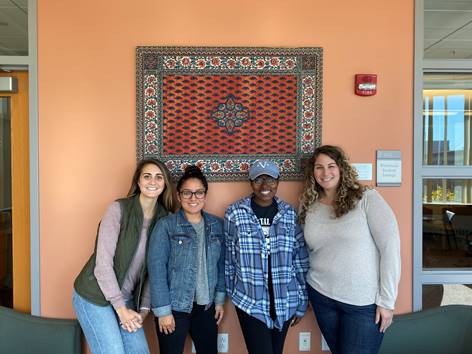A STEP in the Right Direction: Simmons University Is Diversifying Boston's Trauma Workforce
When researchers identified violence-based trauma as a major health issue in Boston’s lower-income neighborhoods, Melinda Gushwa was not surprised. “Unfortunately, we knew that many kids who experience trauma were less likely to get the help they needed because of inequities in our health and mental healthcare systems," says Gushwa, an Associate Professor and Director of the School of Social Work at Simmons University. “We also knew we have a shortage of social workers trained in trauma who are people of color. We wanted to fill that gap.”
To make this happen, Gushwa added another title: she’s Director of the Simmons Trauma Education Project, or STEP, which was launched with a grant from Boston Children’s Collaboration for Community Health. The goal of STEP is to diversify, expand and strengthen the local mental health workforce. The program will help prepare the emerging trauma-informed workforce to provide culturally relevant trauma care for Boston’s vulnerable children and families seeking quality mental health care.
Aiding the disenfranchised
There are myriad reasons a program like STEP is needed. Often, people of color who’ve suffered trauma simply don’t seek help (for either themselves or their children) due to a lack of diversity in the trauma-specialist workforce. After all, “in many situations,” Gushwa notes, “people with power are causing the oppression or discrimination that leads to trauma.” Adding trauma practitioners with whom victims can identify, and who have a fuller idea what their life is like, is a powerful tool in breaking down these barriers.
STEP will feature two components:
- It will offer $10,000 stipends to students from diverse backgrounds who commit to pursuing a Certificate in Trauma Practice at Simmons. Candidates must also commit to working two years in the Boston area. “We’ll have 18 students by the end of the third year,” Gushwa says. “That may not sound like a lot, but they have a major impact, providing assistance that really matters to kids while also adding important diversity.”
- Also by the end of its third year, STEP will have trained 58 Boston-area practitioners in trauma-informed supervision with an emphasis on diversity. The comprehensive plan includes four in-person training sessions, followed by a learning community, and finally a virtual online meeting in which trainees discuss their cases and receive advice on best practices. Trainees will also perform practice simulations with diverse populations.
Planning for success
Simmons will carefully track the evolution of STEP, relying in part on ARTIC (Attitudes Related to Trauma Informed Care), a standardized test and scale developed by the Traumatic Stress Institute. Candidates will take the test before and after training as a measure of progress. There are other evaluation methods in place as well, and both practitioners and supervisors will perform process recordings to analyze on and improve their interaction skills. Finally, Simmons will track the number of participants who follow through on their two-year post-studies commitment.
The result, Gushwa says, is that “both scholars and supervisors will have increased competence and confidence.”

